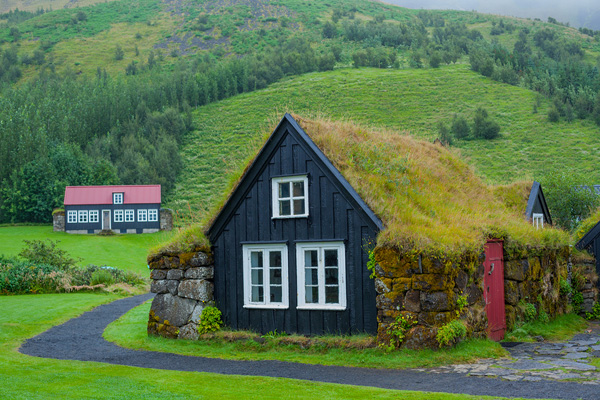Christmas in Iceland
Summary: Learn how people celebrate Christmas and the New Year in Iceland - traditions, food, church, gift exchange and more.

The holiday season in Iceland is a magical time, where the dark winter days are illuminated by the warmth of Christmas lights and the joy of New Year's celebrations. For expats and digital nomads experiencing their first holiday season in this Nordic nation, the festivities are deeply rooted in tradition and community spirit.
Christmas in Iceland
Christmas, or 'Jól' in Icelandic, is a time for family, feasting, and folklore. The season officially begins four Sundays before Christmas Day with the lighting of the first Advent candle, marking a period of anticipation and preparation. Homes and streets are adorned with twinkling lights and decorations, creating a cozy atmosphere against the snowy backdrop.
Icelanders have not one, but thirteen Santas, known as the Yule Lads. These mischievous characters, each with their own personality and story, visit children for the thirteen nights leading up to Christmas. Children place their shoes on windowsills, and if they've been good, they wake to find small gifts left by the Yule Lads. If not, they might find a potato instead.
Gift-giving is an integral part of the Icelandic Christmas, with books being a particularly popular present. The tradition of Jólabókaflóð, or the Christmas Book Flood, sees a flurry of new book releases just before the holiday season, and many Icelanders gift books to be read on Christmas Eve, often while enjoying a cup of hot chocolate or jólabland, a festive non-alcoholic drink.
Traditional Foods and Desserts
The holiday table in Iceland boasts an array of traditional dishes. On Christmas Eve, families often enjoy a meal of 'hangikjöt', smoked lamb, or 'ptarmigan', a type of game bird. Side dishes may include 'laufabrauð', a decorative, fried flatbread, and 'hákarl', fermented shark, for the more adventurous. Desserts are just as important, with 'jólakaka', a Christmas cake, and 'kleinur', a type of twisted doughnut, being favorites.
New Year's Eve is another culinary highlight, with many opting for a luxurious dinner featuring lobster or 'skata', fermented skate, which is traditionally eaten on December 23rd but enjoyed by some on New Year's as well.
Christmas Eve and Christmas Day
Christmas Eve is the centerpiece of the holiday, with most Icelanders celebrating at home with their families. The evening typically begins with a church service, attended by many, where the story of Christmas is told and carols are sung. Afterward, families gather for their main Christmas meal, followed by the exchange of gifts and reading of new books into the night.
Christmas Day is quieter, often spent relaxing with family, enjoying leftovers, and for some, attending church services again. The serene and intimate nature of the holiday provides a stark contrast to the lively celebrations that follow on New Year's Eve.
Festive Decorations and Markets
Towns and neighborhoods across Iceland embrace the holiday spirit with impressive light displays and decorations. Reykjavik, the capital, is particularly known for its festive ambiance, with the Christmas market in Ingólfstorg Square offering handicrafts, warm drinks, and traditional Icelandic Christmas food. The city's main shopping street, Laugavegur, is also a hub of holiday activity, with beautifully decorated windows and a palpable festive buzz.
Akureyri, in the north of Iceland, is another hotspot for holiday festivities. Its Christmas Village is a charming destination, complete with a visit from the Yule Lads, a range of Christmas stalls, and a large, beautifully lit Christmas tree.
New Year's Celebrations
New Year's Eve in Iceland is a spectacular affair. As the clock strikes midnight, the sky lights up with fireworks displays that are largely community-funded and operated. Locals gather around bonfires, sing traditional songs, and reflect on the year gone by while welcoming the new one. The sense of community and shared celebration makes for an unforgettable experience.
In conclusion, the holiday season in Iceland is a blend of unique traditions, heartfelt celebrations, and communal warmth. From the arrival of the Yule Lads to the explosion of New Year's fireworks, expats and digital nomads will find themselves enveloped in a festive atmosphere unlike any other. Whether it's through sharing a traditional meal, exchanging books on Christmas Eve, or joining the locals by a bonfire, the spirit of the Icelandic holidays is sure to create lasting memories for those experiencing it for the first time.
About the Author
 Betsy Burlingame is the Founder and President of Expat Exchange and is one of the Founders of Digital Nomad Exchange. She launched Expat Exchange in 1997 as her Master's thesis project at NYU. Prior to Expat Exchange, Betsy worked at AT&T in International
and Mass Market Marketing. She graduated from Ohio Wesleyan University
with a BA in International Business and German.
Betsy Burlingame is the Founder and President of Expat Exchange and is one of the Founders of Digital Nomad Exchange. She launched Expat Exchange in 1997 as her Master's thesis project at NYU. Prior to Expat Exchange, Betsy worked at AT&T in International
and Mass Market Marketing. She graduated from Ohio Wesleyan University
with a BA in International Business and German.
Some of Betsy's articles include 12 Best Places to Live in Portugal, 7 Best Places to Live in Panama and 12 Things to Know Before Moving to the Dominican Republic. Betsy loves to travel and spend time with her family. Connect with Betsy on LinkedIn.
Additional Information:
- Iceland Guide
- Healthcare & Health Insurance in Iceland
- Members Talk about Healthcare & Health Insurance in Iceland
- Best Places to Live in Iceland
- Real Estate in Iceland
- Guide to Real Estate in Iceland
- Pros & Cons of Living in Iceland
- Cost of Living in Iceland
- Culture Shock in Iceland
- Homeschooling in Iceland
- How to Enroll Your Children in School in Iceland
- Educational System in Iceland
- Pros and Cons of Living in Iceland 2025



